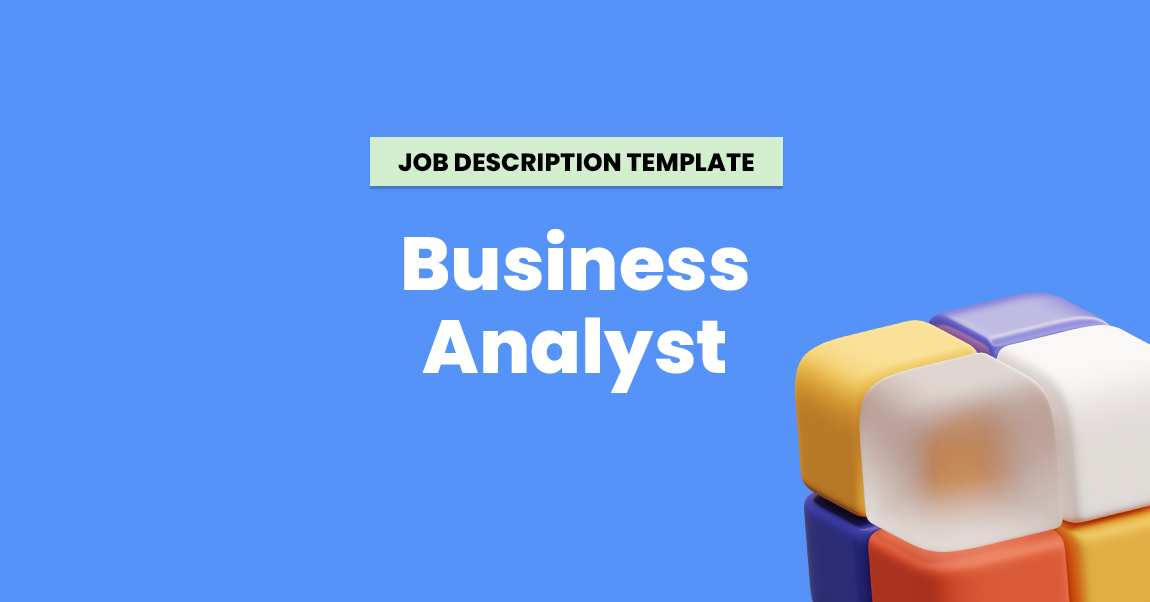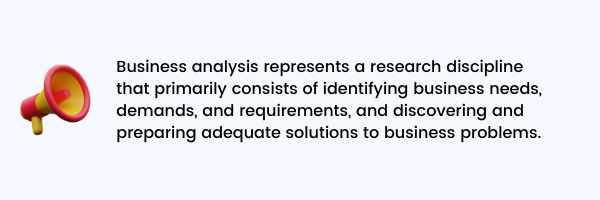Job Description Template
Business Analyst Job Description

The demand for skilled Business Analysts has reached unprecedented heights. The U.S. Bureau of Labor Statistics projects 11% growth between 2023 and 2033—faster than average for all occupations. But here’s what most companies miss: the role itself is transforming rapidly, and traditional job descriptions are failing to attract top talent.
AI is reshaping what Business Analysts do daily, moving them from data gatherers to strategic decision architects. Remote work has fundamentally changed collaboration requirements. Yet many hiring managers are still posting job descriptions that could have been written five years ago.
Let’s rethink how you approach Business Analyst hiring in 2025.
The Market Reality: Why Business Analyst Hiring Is More Competitive Than Ever

As of mid-2025, the average U.S. business analyst salary stands at $109,058 per year, with a range from $80,000 at the 25th percentile to over $138,000 at the 90th percentile. But salary alone isn’t driving the talent shortage.
What we’re seeing with current market trends:
- AI-exposed industries are experiencing accelerated revenue growth since 2022, creating intense demand for analysts who can bridge technical and business domains
- 85% of enterprise decision-makers believe they have two years to transform digitally or risk falling behind
- 94% of data and AI leaders say interest in AI is leading to greater focus on data—but most companies haven’t started managing data for AI implementation
The reality in today’s tech landscape is that Business Analysts are no longer just requirements gatherers. They’re becoming the critical bridge between AI capabilities and business strategy.
What Modern Business Analysts Actually Do (Beyond Traditional Job Descriptions)
The Evolution of the Role:
Traditional Business Analysts focused on process documentation and requirements gathering. Today’s BAs are moving from being data gatherers to data interpreters and strategy advisors, working at the intersection of:
- AI Integration Planning: Understanding how machine learning and generative AI can solve specific business problems
- Digital Transformation Strategy: Designing processes that align with sustainability goals and ESG metrics
- Cross-Functional Collaboration: Hybrid work models require new communication frameworks and virtual stakeholder management skills
- Predictive Analytics: Leveraging AI-powered tools for real-time decision support rather than historical reporting
Here’s what most companies miss about modern BA requirements: The technical skills have expanded dramatically. Essential capabilities now include basics of AI, machine learning understanding, data visualization design, and ethical AI application.
The Complete 2025 Business Analyst Job Description Template
Company Overview Section
[Customize this section to reflect your organization’s digital transformation journey and AI adoption plans]
We’re looking for an experienced Business Analyst who thrives in our evolving tech landscape. As organizations accelerate AI adoption and navigate hybrid work environments, our ideal candidate will serve as the strategic bridge between business objectives and technical implementation.
You’ll collaborate with cross-functional teams to translate complex business needs into actionable solutions, leveraging both traditional analysis techniques and emerging AI-powered tools to drive data-informed decision-making.
Core Responsibilities
Strategic Analysis & Planning
- Analyze business processes and identify optimization opportunities using both traditional methods and AI-powered analytics tools
- Develop predictive models and scenario planning to anticipate market trends and business impacts
- Design digital transformation roadmaps that incorporate AI/ML capabilities
- Evaluate sustainability initiatives and ESG metrics integration into business processes
Stakeholder Management & Communication
- Facilitate virtual workshops and agile ceremonies across distributed teams
- Translate technical AI/ML concepts into business language for executive stakeholders
- Manage requirements gathering in hybrid and remote work environments
- Build consensus among technical and business teams on complex transformation projects
Technical Analysis & Documentation
- Create data flow diagrams and process maps for AI-enhanced workflows
- Develop user stories and acceptance criteria for agile development teams
- Perform gap analysis between current state and AI-optimized future state
- Design testing strategies for AI-integrated business solutions
Data & Analytics Focus
- Collaborate with data teams to ensure business requirements align with AI/ML model capabilities
- Support unstructured data management initiatives for generative AI implementation
- Create business intelligence dashboards and performance metrics
- Validate AI-generated insights against business logic and domain expertise
Required Skills & Qualifications
Essential Technical Competencies
- Advanced Analytics Tools: Proficiency in SQL, Tableau, Power BI, or similar platforms
- AI/ML Awareness: Understanding of machine learning basics, generative AI applications, and data interpretation from AI systems
- Project Management: Experience with Agile/Scrum methodologies, particularly in remote/hybrid environments
- Documentation Platforms: Advanced skills in Confluence, JIRA, or equivalent collaboration tools
Business Analysis Fundamentals
- 3+ years of professional experience in business analysis or related analytical roles
- Experience with process modeling, gap analysis, and requirements management in digital transformation contexts
- Understanding of data privacy, governance, and ethical AI considerations
- Strong financial analysis and ROI calculation capabilities
Modern Collaboration Skills
- Exceptional virtual communication and stakeholder management abilities
- Experience facilitating remote workshops and cross-functional team alignment
- Ability to translate complex technical concepts for non-technical audiences
- Cross-functional collaboration skills for aligning AI innovation with business strategy
Preferred Qualifications
- Bachelor’s degree in Business Administration, Data Science, or related analytical field
- Certifications such as CBAP, PMI-PBA, or data analytics credentials (Microsoft Data Analyst Associate, Google Data Analytics Certificate)
- Experience in your specific industry vertical (fintech, healthcare, e-commerce, etc.)
- Familiarity with cloud platforms (AWS, Azure, GCP) and their business applications
Compensation & Benefits Insight
2025 Market Rates: Based on current market data, competitive salary ranges are:
- Entry Level (0-2 years): $65,000 – $78,000
- Mid-Level (3-6 years): $85,000 – $110,000
- Senior Level (7+ years): $115,000 – $140,000+
Companies are offering significant wage premiums (up to 25% above base salary) for candidates with AI skills. Remote work capabilities and hybrid collaboration experience also command premium compensation.
Why Hiring the Right Business Analyst Is Critical in 2025
The Strategic Impact:
Companies embracing AI in R&D are seeing 50% reduction in time-to-market and 30% cost reduction in industries like automotive and aerospace. The difference between success and failure often comes down to having Business Analysts who can:
- Bridge the gap between AI capabilities and business requirements
- Navigate the complexity of hybrid team dynamics
- Design processes that scale with digital transformation
- Balance innovation speed with risk management and compliance
The Cost of Getting It Wrong:
When Business Analysts lack modern technical fluency or remote collaboration skills, projects fail. We’ve seen organizations invest millions in AI initiatives only to struggle with implementation because their BAs couldn’t translate between technical and business domains effectively.
How to Identify the Right Candidate: Beyond Resume Screening
Interview Focus Areas for 2025:
- AI Integration Scenarios: Present real business problems and ask how they would evaluate AI/ML solutions
- Remote Collaboration: Discuss their experience managing stakeholders across distributed teams
- Process Innovation: How they approach redesigning workflows for digital-first environments
- Ethical Decision Making: Their framework for evaluating AI bias, data privacy, and transparency requirements
Red Flags to Watch For:
- Purely traditional analysis experience without exposure to modern data tools
- Inability to discuss AI impact on business processes
- Limited experience with agile methodologies or remote team coordination
- Focus solely on documentation rather than strategic problem-solving
Business Analyst Interview Questions for 2025
Technical & Strategic Questions:
- How would you approach analyzing whether generative AI could improve our customer service processes?
- Describe your experience managing requirements gathering in a hybrid work environment.
- Walk me through how you would evaluate the ROI of implementing predictive analytics in our operations.
- How do you ensure data privacy and ethical considerations when recommending AI-powered solutions?
Collaboration & Communication: 5. Give an example of how you’ve translated complex technical requirements for executive stakeholders. 6. How do you maintain project momentum when team members are distributed across time zones? 7. Describe a situation where you had to build consensus between technical and business teams on a controversial decision.
Problem-Solving & Innovation: 8. How would you identify processes in our organization that are prime candidates for AI enhancement? 9. Describe your approach to change management when implementing new digital tools or processes. 10. How do you stay current with emerging technologies and assess their business relevance?
The Future-Ready BA: Skills for Long-Term Success
Continuous Learning Requirements:
The landscape is shifting faster than ever, and staying relevant means acquiring new skills regularly. Forward-thinking organizations should look for candidates who demonstrate:
- Active learning in AI/ML fundamentals
- Participation in data science or business intelligence communities
- Experience with emerging collaboration tools and platforms
- Understanding of industry-specific regulatory changes affecting data and AI
Career Progression Pathways:
The typical career path now includes: Entry-level BA → Senior Business Analyst → Product Manager or Analytics Manager → Director/VP of Analytics. The most successful candidates show progression toward strategic roles that combine business acumen with technical fluency.
Conclusion: Partnering for Success
The Business Analyst role has evolved from support function to strategic necessity. With 11% projected growth and average salaries exceeding $109,000, competition for top talent is intensifying.
Success in 2025 requires more than posting job descriptions and hoping for qualified applicants. It demands understanding how the role has transformed, what skills truly matter in today’s market, and how to identify candidates who can bridge the gap between traditional business analysis and emerging technology capabilities.
At Omnes Group, we’ve built our process around understanding these actual project needs and market realities. Rather than sending generic candidate profiles, we focus on matching your specific technical requirements with professionals who understand both the business implications and technical possibilities of modern analytics and AI integration.
Ready to find Business Analysts who can drive your digital transformation forward?>> Let’s discuss how the current market dynamics affect your specific hiring needs and develop a strategy that attracts candidates with the right blend of traditional analysis skills and modern technical fluency.